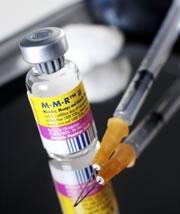 Researchers who have studied MMR are up for review as doctors.TEK IMAGE / SCIENCE PHOTO LIBRARY
Researchers who have studied MMR are up for review as doctors.TEK IMAGE / SCIENCE PHOTO LIBRARYUptake of the measles, mumps and rubella (MMR) vaccine plummeted in Britain after doctor and researcher Andrew Wakefield suggested in 1998 that it could be linked to autism — a suggestion that made huge waves in the media and with the public. Subsequent studies have ruled out a link between MMR and autism, and the majority of medical opinion now firmly rejects Wakefield's hypothesis. This week, Wakefield stands before a hearing at the General Medical Council (GMC) — the body that regulates doctors in the United Kingdom.
Who is being charged with what?
The GMC panel is looking into allegations of serious professional misconduct against Wakefield and two colleagues, John Walker-Smith and Simon Murch. Reading of the full charges against them on Monday, at the start of the hearing, took more than an hour.
Amongst these allegations is that they undertook research without "proper ethical approval". Wakefield and Walker-Smith are also alleged to have acted against the interests of children taking part in a study published in The Lancet1 (the paper that spurred Wakefield to suggest a link between MMR and autism) by administering a "purportedly therapeutic substance" to one child before obtaining information about the safety of the substance.
In addition, Wakefield allegedly failed to disclose to the ethics committee approving his work that he was being paid to advise solicitors involved in MMR litigation.
Perhaps the most eye-catching allegation the GMC lists is that "Wakefield acted unethically and abused his position of trust as a medical practitioner by taking blood from children at a birthday party to use for research purposes without ethics committee approval, in an inappropriate social setting, and whilst offering financial inducement".
Wakefield has denied the overall charge of professional misconduct; all three will put forward their views over the course of the hearing. Nature was unable to contact Wakefield before going to press.
How does all that relate to the MMR scare?
Only indirectly. Many of the charges against the three relate to research presented in the controversial Lancet paper, on which all were authors. But the GMC is not looking at the evidence for a link between MMR and autism, nor addressing that question.
Nevertheless the hearing has again given further publicity to those who claim a link. The first meeting of the GMC panel saw protesters supporting Wakefield camped outside.
How long will it take?
The hearing is scheduled to run until 19 October this year. That's a lot longer than most GMC cases, but the council says this is "not unheard of".
If cleared of any wrongdoing by the panel, Wakefield and his co-defendants will in theory be free to practise as doctors. If the panel finds against them it will have a number of options. It could prevent them working again as doctors, either by erasing their names from the medical register or suspending them for a set period of time. Or it could place restrictions on their ability to practise medicine — such as requiring them to be supervised.
If the panel decides to strike Wakefield off the medical register, what would this mean for his research?
Technically the GMC panel will only look at Wakefield, Walker-Smith and Murch's work as doctors in the United Kingdom. However, if they decide that they should be struck off (which is by no means certain), their ability to access research funding is likely to be seriously curtailed.
ADVERTISEMENT
The UK Medical Research Council says it has never had a grant application from anyone who has been struck off the medical register and that it would be very difficult for such people to apply, given that applicants have to be from a hospital or academic institution. The UK Biotechnology and Biological Sciences Research Council takes a similar view, adding that a researcher who could not work with human subjects might be able to do bench work. But Wakefield has a loyal group of supporters and he could decide to undertake private research.
Wakefield's name has continued to appear on research papers about autism2, and he has a research position at the Thoughtful House Center for Children in Austin, Texas. "This inquiry has no bearing on the vital and responsible research taking place at Thoughtful House or on Dr Wakefield's position here," says Anissa Ryland, director of operations for Thoughtful House. "His work has been exemplary and our commitment to serving children with developmental disorders remains, and will remain, unchanged."
Visit our hearingstartsinb.html">newsblog to read and post comments about this story.
